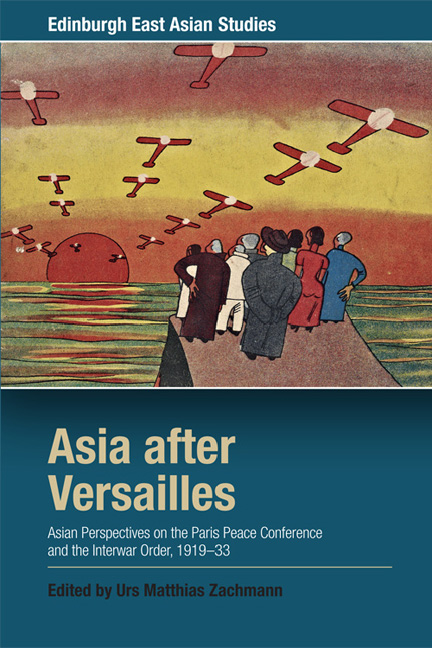 Asia after Versailles
Asia after Versailles Book contents
- Frontmatter
- Contents
- List of Illustrations
- Notes on Contributors
- Acknowledgments
- Introduction: Asia After Versailles
- Part I
- Part II
- 4 A Cultural History of Diplomacy: Reassessing the Japanese ‘Performance’ at the Paris Peace Conference
- 5 India's Freedom and the League of Nations: Public Debates 1919–33
- 6 Dashed Hopes: Japanese Buddhist Perspectives on the Paris Peace Conference
- 7 Particularism and Universalism in the New Nationalism of Post-Versailles Japan
- 8 Versailles and the Fate of Chinese Internationalism: Reassessing the Anarchist Case
- 9 The Impact of Versailles on Chinese Nationalism as Reflected in Shanghai Graphic and Urban Culture, 1919–31
- Index
4 - A Cultural History of Diplomacy: Reassessing the Japanese ‘Performance’ at the Paris Peace Conference
from Part II
Published online by Cambridge University Press: 22 December 2017
- Frontmatter
- Contents
- List of Illustrations
- Notes on Contributors
- Acknowledgments
- Introduction: Asia After Versailles
- Part I
- Part II
- 4 A Cultural History of Diplomacy: Reassessing the Japanese ‘Performance’ at the Paris Peace Conference
- 5 India's Freedom and the League of Nations: Public Debates 1919–33
- 6 Dashed Hopes: Japanese Buddhist Perspectives on the Paris Peace Conference
- 7 Particularism and Universalism in the New Nationalism of Post-Versailles Japan
- 8 Versailles and the Fate of Chinese Internationalism: Reassessing the Anarchist Case
- 9 The Impact of Versailles on Chinese Nationalism as Reflected in Shanghai Graphic and Urban Culture, 1919–31
- Index
Summary
On 16 December 1918, the American journalist Walter Duranty wrote for The New York Times:
‘It is far worse than when the Czar of Russia visited Paris – you would think every Parisian had determined not to rest happy until he had a close personal view of President Wilson.’ The speaker was a veteran gendarme attached to the force guarding the entrances of the Rue de Monceau where Prince Murat's house is situated, from the overcurious crowds…. Somehow the news had spread yesterday … that the president had been to church and would return at about noon. The result was an enthusiastic gathering before the police barriers – hundreds of people, quiet and well-behaved, in their Sunday clothes, but resolved not to leave the spot before the President had passed…. Suddenly, the boy on the outskirts of the crowd cried: ‘Le voila!’ as a limousine turned a corner. Hats came off, flags and handkerchiefs were waved, and the air rang with shouts of ‘Vive Wilson! Vive le President!’ Smiling with unaffected pleasure the Presidential party passed through the hedge of spectators down the street…. Not the least striking feature of the President's popularity is Parisians have learnt how to cheer in order to greet him properly…. There has been another change in the city during the last few weeks. Paris is recovering its old gayety…. Now with illuminations in Wilson's honor, confetti have reappeared on the boulevards, until the pavements are covered with the bright-hued jetsam.
The above reporting tells us many things: the symbolic linking of Wilson with the French aristocracy, the heroic stature of Wilson amongst Parisians, and added to this the evident smugness that even the French have had to change their old ways and learn to do things in an American way in order to please the President. Indeed, the media covered Wilson's activities with a paparazzi-like zealousness – such as reporting on Wilson being seen at the races, Wilson seen on his daily round of motoring in the Bois de Boulogne, and so on and so forth.
- Type
- Chapter
- Information
- Asia after VersaillesAsian Perspectives on the Paris Peace Conference and the Interwar Order, 1919-33, pp. 101 - 123Publisher: Edinburgh University PressPrint publication year: 2017


